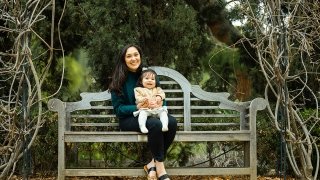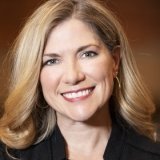Cynthia Diana Villarreal has moved beyond how life is “supposed” to go
Cynthia Diana Villarreal embodies the classic idea of the American Dream—a student from a low-income family who, with unshakeable determination, became the first in her family to go to college and earn a doctorate from no less an institution than the University of Southern California.
But her path to such a milestone also reflects how grand ideals of upward mobility often contend with reality, with systems that impede such success at every turn either by design or neglect.
Villarreal graduates this month with a PhD in Urban Education Policy from USC Rossier, and her own experiences are now informing her research into how students can be better supported by their colleges and universities.
Growing up in El Paso, Texas, Villarreal said she had a happy childhood with great parents, but navigating college admissions as a first-generation student had its difficulties.
“Most prospective students go on college visits, they have a network they can connect with at college campuses,” she said. Villarreal did not have that experience. She applied to one college; it accepted her and, with the offer of a full ride, she went.
“The first time I stepped foot on campus was when I moved in,” Villarreal said. “It’s funny because now that I’m doing research on trust in admissions, I realized I didn’t have that. I was putting my blind faith in this institution and that it would be everything I needed.”
Transplanted
Villarreal realized quickly that she hadn’t found the right fit, and that she hadn’t appreciated or known what to ask about campus culture, especially about her college’s support for first-generation, Latina students.
She moved back home, transferring to the University of Texas at El Paso while looking for a longer-term solution. Determined not to stumble again, Villarreal put in the research while facing a relentless bureaucracy.
“When I think about it now, I was given the run-around: you have to go to the business office, counseling, financial aid, etc.” she said. “I could have said, ‘this is too much work, I’m not going to try.’”
That experience tracks with a wave of recent research showing that, in the words of Columbia University senior scholar Davis Jenkins, “transfer students are one of most abused [groups of] students.” A 2017 report by the U.S. Government Accountability Office found that the average transfer student loses about an entire semester’s worth of credits, among other issues.
Villarreal would go on to graduate from Texas Tech with a bachelor’s degree in English and anthropology. Now officially labeled a Hispanic-Serving Institution (HSI), Texas Tech set Villarreal on her eventual path toward her doctorate.
“If I didn’t have that experience, I don’t know if I would be here right now,” she said. “That’s why I’m so passionate and invested in doing research in HSIs, and I know they matter.”
To California
If Villarreal’s college experience didn’t go as she initially expected, the same can be said of her doctoral program.
After teaching sixth grade English in San Antonio, Villarreal completed a master’s degree in educational leadership and policy studies at the University of Texas at San Antonio. A professor there, Laura I. Rendón, nudged Villarreal toward USC Rossier.
Villarreal arrived at USC in Fall 2015, but her advisor, Professor Alicia Dowd, had just taken a new job at Penn State. Dowd offered Villarreal an invitation to join, but having just moved from San Antonio with her fiancé, Elias M. Villarreal, she stayed in the program, working with Professor Estela Mara Bensimon at the Center for Urban Education. It might not have been how things were supposed to go, but CUE would provide a formative experience.
“As a teacher, I felt powerless to change things at a policy level,” she said. “I had an impact on my students, but I knew I wasn’t doing any transformative changes to the institution. I was already thinking about institutional policy, but I didn’t have the language to know how to study it until [working at CUE].”
At the same time, Villarreal and Elias, who is studying to be a veterinarian, also decided to grow their family, welcoming baby Diana in February 2019. It was a difficult choice, she says, because of the kind of scrutiny that is often leveled at early career scholars who have children.
“I was in my head that I wasn’t supposed to have a daughter during the program, but then I decided I’m doing what’s best for me,” she said.
Villarreal credits both faculty and staff, and especially PhD program director Laura Romero and advisor Alex Atashi, for helping her navigate leave policy and providing her space to work on her dissertation.
“I’ve been surprised but very grateful.”
Finding grace
Villarreal decided to focus her research on faculty hiring decisions at HSIs as a borderlands cultural practice and the factors that reproduce White-dominated professoriates. (Borderlands theory examines the concept of geographical and other kinds of borders as instruments that are socially produced, specifically looking at a U.S.–Mexico context.) Research shows the importance of a diverse faculty to the success of a diverse student body.
Villarreal found a new advisor and mentor in Associate Professor Julie Posselt, an expert on college admissions within the Pullias Center for Higher Education. They found a connection as former employees of the McNair Scholars program and as mothers in academe. Posselt calls Villarreal “a joy to mentor.”
“Cynthia is showing that borders are not just places where some line that we draw separates places or cultural spaces,” Posselt said. “Her research and her life show that the border is also where they come together. Whether it’s across countries or across roles as scholar and mother, she’s showing that in their coming together, there’s wisdom and possibility that higher education and society needs.”
Villarreal has also put interest into action, co-founding the student organization Latina PhDs at USC, a community- and support-building group.
“I was shocked to find that challenges like imposter syndrome, microaggressions, implicit and explicit biases from colleagues continue even after earning a doctorate,” she said. “I've intentionally sought out community from other Latinas because we can show love for each other and support one another in a way that is uniquely ours.”
Villarreal is taking life in stride even as the COVID-19 pandemic has put a damper on graduation (Villarreal was selected to be the PhD flagbearer by her peers). Her life has rarely gone the way it was “supposed” to, but that hasn’t stopped her yet; she’s made of strong stuff.
And besides, there’s something bigger to look forward to: As Villarreal prepares to defend her dissertation this summer, she is excited that her daughter will grow up with two doctors for parents.
“It’s a lot to take in,” she said, “and I’m very grateful.”





